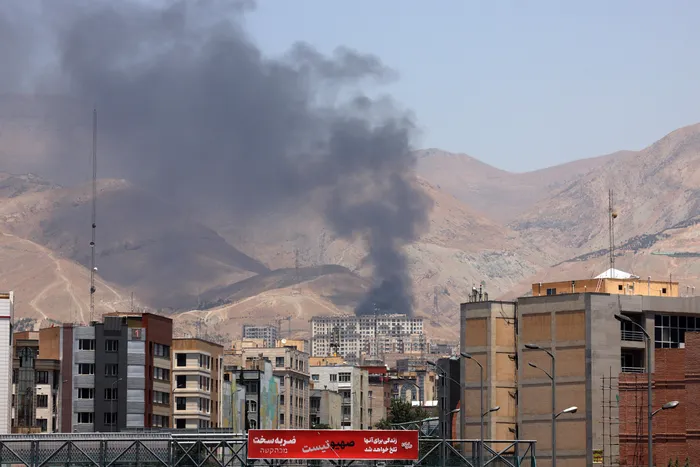
Smoke billows for the second day from the Shahran oil depot, northwest of Tehran, on June 16, 2025. Iran unleashed a barrage of missile strikes on Israeli cities early on June 16, after Israel struck military targets deep inside Iran, with both sides threatening further devastation.
Image: AFP
Israel and Iran traded deadly fire for a fourth day, yesterday in their most intense confrontation in history, fuelling fears of a drawn-out conflict that could engulf the Middle East.
The longtime foes have fought a prolonged shadow war through proxies and covert operations, with Israel battling several Iran-backed groups in the region, including Hamas in the Gaza Strip since October 2023.
World leaders and allies of both nations were concerned that the clash could escalate into something far greater and asked for an easing of tensions.
The UN was worried the battles were likely to “compromise nuclear safety”.
The South African government has expressed its “deep concern” over the escalation of hostilities between the two warring nations.
The conflict is set to dominate the agenda at the G7 Leaders Summit in Kananaskis, Alberta, Canada this week as world leaders gather at the G7 meeting, with fears that the war could degenerate into a broader Middle East war.
President Cyril Ramaphosa is attending the G7 Summit.
Chrispin Phiri, spokesperson for Minister of International Relations and Cooperation, Ronald Lamola, said South Africa extended its condolences to people of both nations who have suffered casualties since the war erupted, resulting in the “tragic loss of life".
“South Africa emphasises that under international humanitarian law, civilians and civilian infrastructure must never be considered legitimate targets.”
Phiri said South Africa was appealing to both nations to comply with international law.
“We reiterate our urgent call for de-escalation, restraint, and full compliance with international law by all parties to prevent further human suffering,” he said.
On Saturday, IOL reported that the government had expressed “profound” concern regarding the attacks conducted by Israel on targets within Iran on Friday, including reported impacts on military areas, nuclear facilities, and civilian infrastructure.
The day before, AFP reported that Iran called Israel's wave of strikes a declaration of war, while US President Donald Trump warned Tehran of "even more brutal" attacks if it does not make a deal on its nuclear programme.
In a major campaign launched on Friday, Israeli fighter jets and drones struck nuclear and military sites in Iran, also hitting residential areas and fuel depots.
Iran's health ministry said at least 224 people were killed and more than 1,200 wounded.
Tehran has responded with barrages of missiles and drones that hit Israeli cities and towns, killing at least 24 people and wounding 592 others, according to the prime minister's office.
Israel has also killed many top military commanders and atomic scientists in Iran as part of an offensive that officials said sought to end nuclear and missile threats from the Islamic republic.
The Israeli military said that after a wave of strikes on yesterday, its forces had destroyed one third of Iran's surface-to-surface missile launchers.
According to military spokesman Effie Defrin, "we have now achieved full air superiority over Tehran".
That followed a wave of intense air raids across the country, from the western border with Iraq to the capital Tehran and as far east as Mashhad, where the airport was hit.
In Tehran, early yesterday, Israel said it hit command centres belonging to the Quds Force, the foreign operations arm of the Islamic Revolutionary Guard Corps.
The Israeli army later issued an evacuation order for Tehran's northern District 3, stating in the coming hours it "will operate in the area, as it had in recent days throughout Tehran, to strike military infrastructure of the Iranian regime".
Reza Sayyad, spokesman for the Iranian armed forces, said their targets in Israel included "sensitive and important" security sites as well as "the residences of military commanders and scientists".
Sayyad, in a televised address, vowed a "devastating response" to the Israeli attacks, while the ‘Revolutionary Guards’ in a statement warned they would hit more "vital targets" in Israel "until its complete destruction".
Residential areas in both countries have suffered, with Israel accusing Iran of deliberately targeting civilians.
After deadly overnight missile fire, Defence Minister Israel Katz warned that "the residents of Tehran will pay the price -- and soon".
The conflict has rapidly escalated despite calls from world leaders to halt the attacks.
China urged Iran and Israel to "immediately" take steps to reduce tensions and "prevent the region from falling into greater turmoil".
Turkish President Recep Tayyip Erdogan told his Iranian counterpart in a phone call yesterday that Ankara was ready to play a "facilitating role" to end the conflict.
Speaking later to his Russian counterpart Vladimir Putin, Erdogan said the "lawless attitude" of Israeli Prime Minister Benjamin Netanyahu's government "poses a clear threat to the international system", adding that the Middle East "cannot tolerate a new war".
Trump has urged the foes to "make a deal", but told reporters on Sunday that "sometimes they have to fight it out" first.
Netanyahu has said the Israeli offensive aimed to thwart the "existential" threats posed by Iran's nuclear and missile programmes.
The fierce bombing campaign began as Tehran and Washington were engaged in nuclear talks -- which have since been cancelled -- and after warnings from the UN nuclear watchdog over Iran's atomic activities.
Rafael Grossi, head of the UN's International Atomic Energy Agency (IAEA), said there was "no indication of a physical attack" on an underground section of Iran's Natanz uranium enrichment facility, and that radiation levels outside the plant were "at normal levels".
The IAEA previously said that a key, above-ground component of Iran's Natanz nuclear site was destroyed.
Grossi told an extraordinary board meeting of the UN agency that "nuclear safety is being compromised" by the conflict.